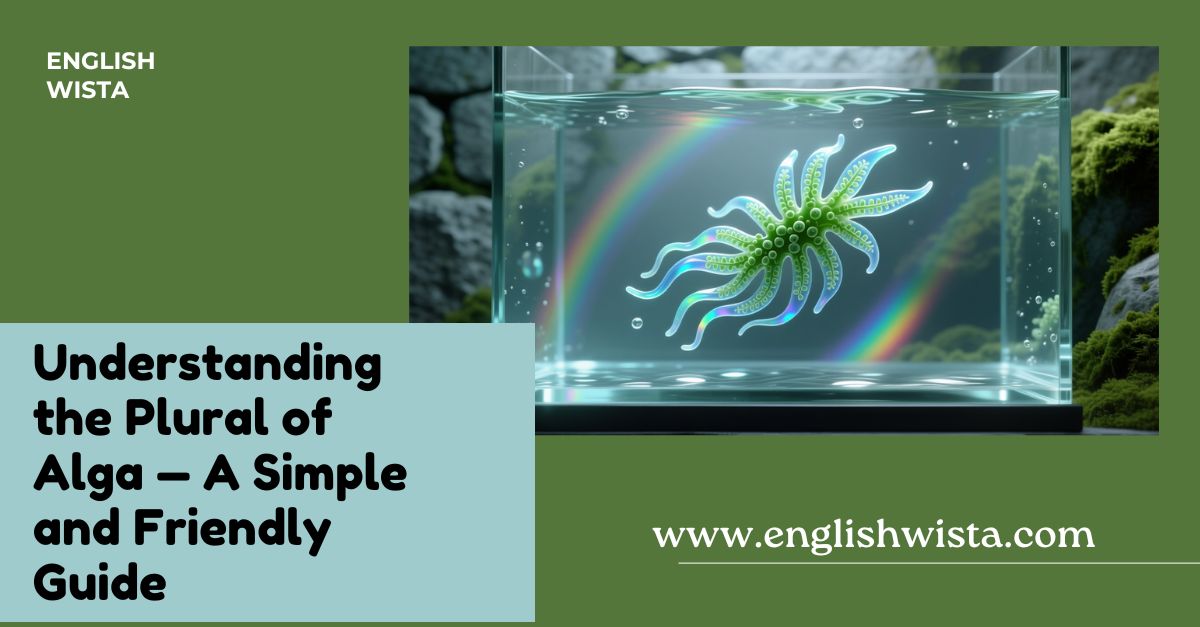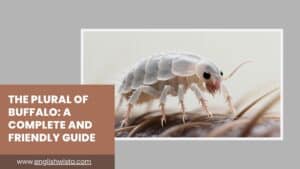Have you ever come across the word alga and wondered, “Wait, is it algae or algas?” You’re not alone! English can be a little tricky when it borrows words from other languages especially Latin. The word alga is one of those that often trips people up because its plural form doesn’t follow the usual English pattern. But don’t worry; by the end of this article, you’ll know exactly when to use alga and when to use algae.
We’ll walk through it step by step what alga means, where it comes from, what its plural form is, and how to use it correctly in everyday sentences. Along the way, we’ll also explore a few fun facts about this word and the fascinating green organisms it describes. So, let’s dive right in!
What Does “Alga” Mean?
Let’s start with the basics.
The word alga refers to a simple, plant-like organism that grows in water or damp places. You’ll often see algae (the plural form) floating on ponds, covering rocks, or even growing on the sides of aquariums.
In simple terms:
- An alga is one of those green, slimy things that grow in water.
- Algae are many of them.
Definition:
An alga is a simple organism that can make its own food through photosynthesis but doesn’t have roots, stems, or leaves like regular plants.
For example:
- “The scientist studied a single alga under the microscope.”
- “The pond was covered with green algae after the rain.”
Notice how the singular and plural forms are used differently in the sentences above.
What Is the Plural of Alga?
Now for the main question: what’s the plural of alga?
The correct plural form of alga is algae (pronounced AL-jee or sometimes AL-gay).
So:
- One = alga
- More than one = algae
That’s it! It’s really that simple once you get the hang of it.
Why Isn’t the Plural “Algas”?
You might wonder, “Why don’t we just add an ‘s’ and say algas like we do with most English words?”
Good question! The reason is that alga is a Latin word, and in Latin, words ending in -a usually form their plural by changing -a to -ae.
Here are a few similar examples:
- Formula → formulae
- Larva → larvae
- Alga → algae
Although English sometimes adopts simpler plurals (like “formulas” instead of “formulae”), in scientific and formal contexts, the Latin plural algae is still used.
So, while “algas” might sound logical in English, it’s not correct. Stick with algae for the plural form.
How Do You Pronounce “Alga” and “Algae”?
Pronunciation can also be confusing, especially since both words look similar. Here’s an easy guide:
- Alga – pronounced AL-guh
- Algae – pronounced either AL-jee or AL-gay, depending on the region.
Both pronunciations of algae are correct, so don’t worry too much about which one you use. Scientists, for example, often say AL-jee, while some people prefer AL-gay.
Is Algae Singular or Plural?
This is another common question. People often say, “The algae is growing fast,” but wait is that correct?
Technically, no. Since algae is plural, it should take a plural verb.
Here’s the correct usage:
- ❌ “The algae is growing fast.”
- ✅ “The algae are growing fast.”
But here’s where it gets interesting: in everyday English, algae sometimes acts like a collective noun, similar to data or bacteria. So, in informal speech, you might hear algae is and it won’t sound too strange. However, in formal writing or scientific contexts, it’s better to say algae are.
If you’re referring to just one organism, say alga.
- “An alga was found on the rock.”
If you mean more than one, use algae.
- “Algae were found in the lake after the storm.”
Examples of “Alga” and “Algae” in Sentences
Let’s look at more examples to make it crystal clear:
Using “Alga” (singular):
- The biologist discovered a new species of alga.
- A single alga can reproduce rapidly under the right conditions.
- The microscope revealed the structure of the alga in detail.
Using “Algae” (plural):
- The ocean floor is covered with colorful algae.
- Scientists study algae to understand their role in producing oxygen.
- Too many algae in a pond can harm fish by blocking sunlight.
If you read these examples aloud, you’ll start to “feel” when each word fits naturally.
Origin of the Word “Alga”
Words often have fascinating histories, and alga is no exception.
The term comes from Latin, where alga simply meant “seaweed” or “marine plant.” Over time, scientists adopted the term in English to describe all kinds of similar water-growing organisms, not just seaweed.
The plural, algae, follows Latin grammar rules, as we saw earlier. English borrowed both forms directly.
So, when you use algae, you’re actually using Latin the right way pretty cool, right?
How Is “Alga” Used in Science?
In science, the term alga (and its plural algae) is used very precisely.
Scientists use it to describe a wide range of photosynthetic organisms from tiny microscopic cells to large seaweeds like kelp. While algae are plant-like, they’re not considered true plants because they lack specialized structures like roots or leaves.
Here’s how scientists might use the term:
- “This alga produces oxygen during photosynthesis.”
- “Marine algae form the base of the ocean’s food chain.”
In biology, algae play an incredibly important role. They produce most of the world’s oxygen and form the foundation of aquatic ecosystems. So next time you see a green layer on a pond, don’t just think “slimy.” Think “essential!”
How Do We Use “Algae” in Everyday Life?
You might be surprised to know that algae aren’t just scientific curiosities. They’re part of everyday life!
For example:
- Food: Some algae, like seaweed, are used in sushi and other dishes.
- Medicine: Certain types of algae are used to make vitamins and supplements.
- Environment: Algae are vital for absorbing carbon dioxide and cleaning water.
So, while you might not use the word alga daily, you’re definitely surrounded by its plural algae in more ways than you realize!
Common Mistakes People Make
Let’s quickly go over a few mistakes learners often make with alga and algae:
- Using “algas” as the plural – Incorrect! Always use algae.
- Using “algae” with a singular verb – Remember, algae are, not algae is (unless it’s informal speech).
- Forgetting that “alga” exists – Some people use algae even when referring to just one organism. Try to use alga for singular cases.
Here’s a simple trick:
If you can count it one, two, three use alga/algae.
If it’s just a general term (like “water has algae”), algae is fine.
A Quick Comparison: Alga vs. Bacterium vs. Fungus
To make things even clearer, let’s compare alga to other scientific words with similar plural patterns:
| Singular | Plural | Example Sentence |
|---|---|---|
| Alga | Algae | Algae are found in oceans and lakes. |
| Bacterium | Bacteria | Bacteria can be both harmful and helpful. |
| Fungus | Fungi | Mushrooms are a type of fungi. |
See the pattern?
These words all come from Latin or Greek, and their plurals often change in unique ways. Once you learn one, it becomes easier to remember others!
Fun Facts About Algae and the Word “Alga”
Here are some fun tidbits to make your learning even more enjoyable:
- Old but Gold: Algae have been around for billions of years some of the oldest life forms on Earth!
- Oxygen Heroes: Algae produce more than half of the world’s oxygen yes, more than all the trees combined!
- Colorful Variety: Not all algae are green. Some are red, brown, or even blue-green.
- Word Family: The adjective form of alga is algal (for example, “algal bloom”).
- Plural Twins: Just like algae, other words like larva/larvae and antenna/antennae follow the same Latin pattern.
Isn’t language fascinating when you see the science behind it?
How to Remember the Plural Easily
If you struggle to remember whether it’s alga or algae, here’s a simple memory trick:
“There’s only one a in alga, but there are two in algae and that’s because there’s more of them!”
It’s a silly little phrase, but it works!
You can also link it to how other Latin plurals work. Once you memorize the pattern, your brain automatically recognizes it.
Quick Recap: What We’ve Learned
Let’s sum up the key points:
- Alga is singular (one organism).
- Algae is plural (more than one).
- The plural isn’t algas because it follows Latin grammar.
- Use algae are (not algae is) in formal writing.
- Both words describe plant-like organisms that perform photosynthesis.
- Algae are found everywhere from oceans to aquariums and are vital to life on Earth.
Conclusion: A Little Word with a Big Impact
Now you know the plural of alga and much more! The next time someone misuses algae or wonders if “algas” is right, you’ll be ready with a confident explanation.
Remember, English is full of fascinating words borrowed from Latin, and alga is one of the most interesting because it connects language, nature, and science all in one.
So, whether you’re gazing at a pond, studying biology, or just brushing up your vocabulary, you can appreciate this little green word for what it really is a tiny but mighty reminder of how language grows and evolves, just like life itself.
Final takeaway:
- One alga → many algae.
- Say it proudly, use it correctly, and never confuse it again!



